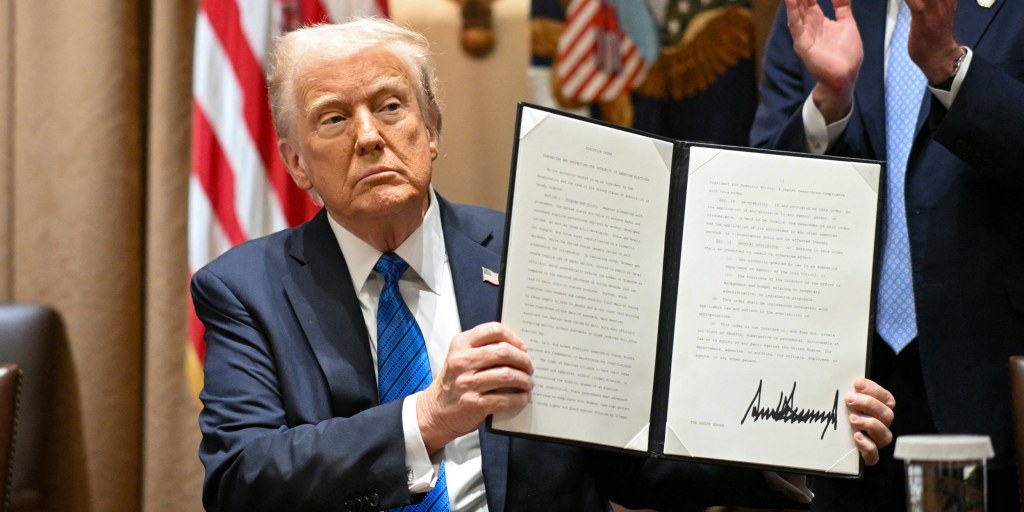Judicial Smackdown: Judge Slams Trump Team for Defying Deportation Flight Restrictions
Politics
2025-04-16 16:17:51Content

In a significant legal development, US District Judge James Boasberg has determined that there is sufficient evidence to pursue criminal contempt charges against Trump administration officials. The ruling stems from the officials' alleged disregard of the judge's mid-March orders prohibiting the use of the Alien Enemies Act to deport individuals suspected of being members of Venezuelan gangs.
The judge's decision marks a critical moment in the ongoing legal battle over immigration enforcement, highlighting potential violations of judicial directives. By finding probable cause for criminal contempt, Judge Boasberg has signaled the serious nature of the administration's apparent defiance of court instructions.
This ruling could have far-reaching implications for how government officials handle deportation proceedings and respect judicial orders, potentially setting a precedent for future immigration-related legal challenges.
Judicial Bombshell: Trump Administration Faces Criminal Contempt in Controversial Deportation Saga
In a dramatic legal development that underscores the complex landscape of immigration enforcement, the United States judicial system has once again thrust itself into the center of a high-stakes confrontation between executive power and judicial oversight. The latest chapter in this ongoing narrative reveals the intricate tensions surrounding deportation policies and the potential legal consequences for government officials who allegedly disregard judicial directives.Explosive Revelations Expose Systemic Challenges in Immigration Enforcement
The Judicial Ruling: Unpacking the Legal Implications
US District Judge James Boasberg's recent ruling represents a pivotal moment in the ongoing scrutiny of immigration enforcement mechanisms. By determining that probable cause exists for criminal contempt, the judge has signaled a significant challenge to the Trump administration's deportation strategies. This decision goes far beyond a mere procedural matter, instead highlighting the fundamental tensions between executive branch actions and judicial constraints. The ruling specifically targets the administration's attempted use of the Alien Enemies Act in relation to alleged Venezuelan gang members. Such a legal maneuver represents a complex intersection of immigration law, national security considerations, and constitutional protections. Judge Boasberg's determination suggests a potential systemic overreach that demands careful judicial intervention.Historical Context of Immigration Enforcement Controversies
The current legal battle is not occurring in isolation but represents a continuation of long-standing debates about immigration policy and executive authority. The Alien Enemies Act, originally conceived during a different historical context, has been increasingly scrutinized for its potential application in modern immigration scenarios. Legal experts have long argued that broad interpretations of such legislation can potentially infringe upon fundamental human rights and due process. The judge's ruling suggests a critical examination of how governmental agencies interpret and implement immigration statutes, particularly when those interpretations might conflict with established judicial precedents.Potential Ramifications for Government Officials
The potential criminal contempt charges carry significant implications for the officials involved. Such proceedings could not only result in personal legal consequences but might also trigger broader institutional reforms within immigration enforcement agencies. This development underscores the critical role of judicial oversight in maintaining checks and balances within the governmental system. By holding officials accountable for potentially unauthorized actions, the judiciary reinforces the principle that no branch of government operates without meaningful constraints.Broader Implications for Immigration Policy
Beyond the immediate legal proceedings, this ruling represents a critical moment in the ongoing national dialogue about immigration enforcement. It raises fundamental questions about the balance between national security concerns and individual rights, challenging policymakers and legal professionals to develop more nuanced and constitutionally sound approaches. The case highlights the complex web of legal considerations that must be navigated when implementing immigration policies. It serves as a powerful reminder that enforcement mechanisms must be carefully constructed to respect both legal boundaries and fundamental human dignities.Future Outlook and Potential Developments
As this legal drama continues to unfold, stakeholders across the political and legal spectrum will be watching closely. The potential criminal contempt charges could set significant precedents for future immigration enforcement strategies and judicial interventions. The ruling represents more than just a singular legal action; it is a profound statement about the mechanisms of governmental accountability and the critical role of an independent judiciary in maintaining the integrity of legal and administrative processes.RELATED NEWS
Politics

Medicaid in the Crosshairs: How GOP Budget Plan Could Backfire on Republicans
2025-03-01 08:00:21







